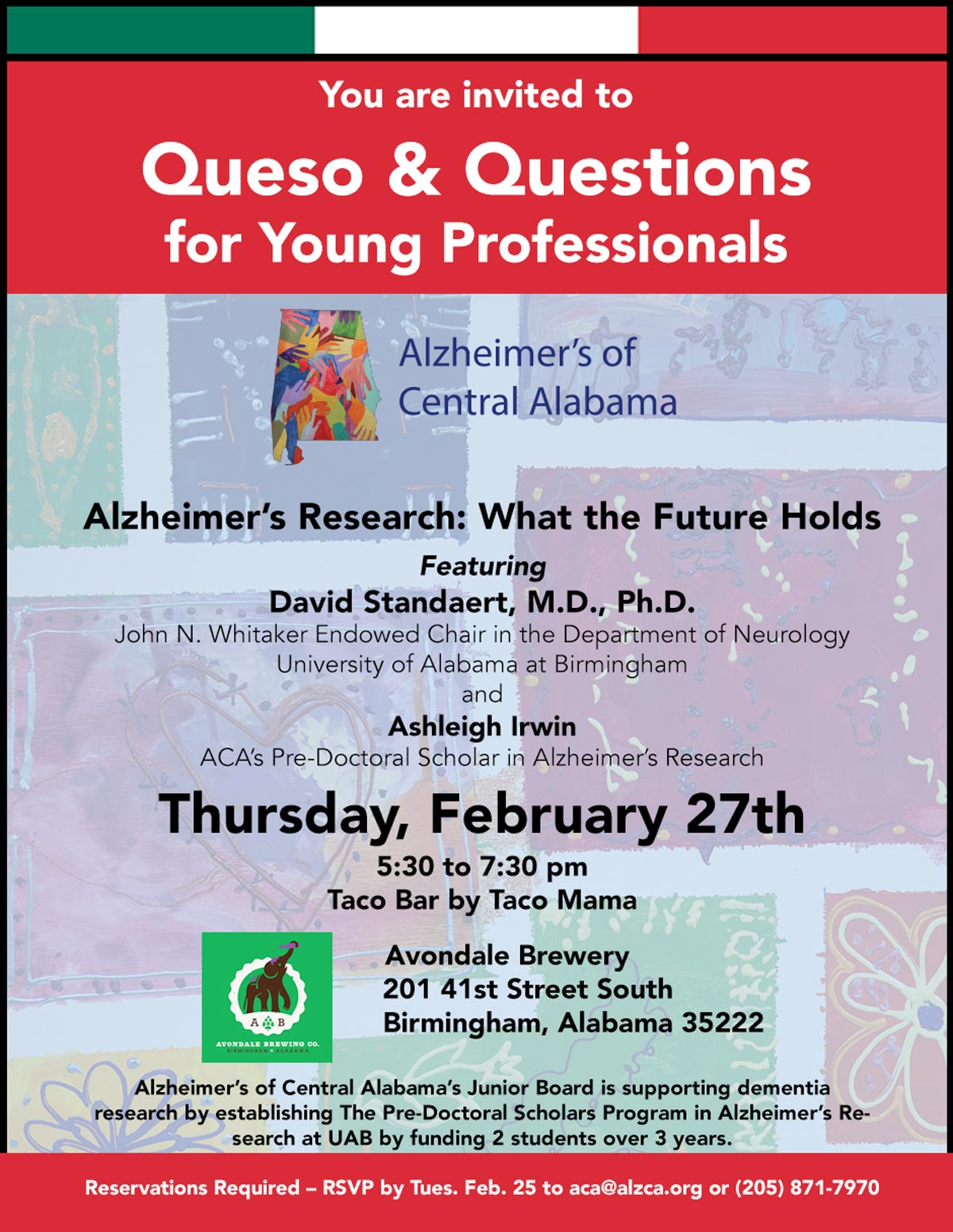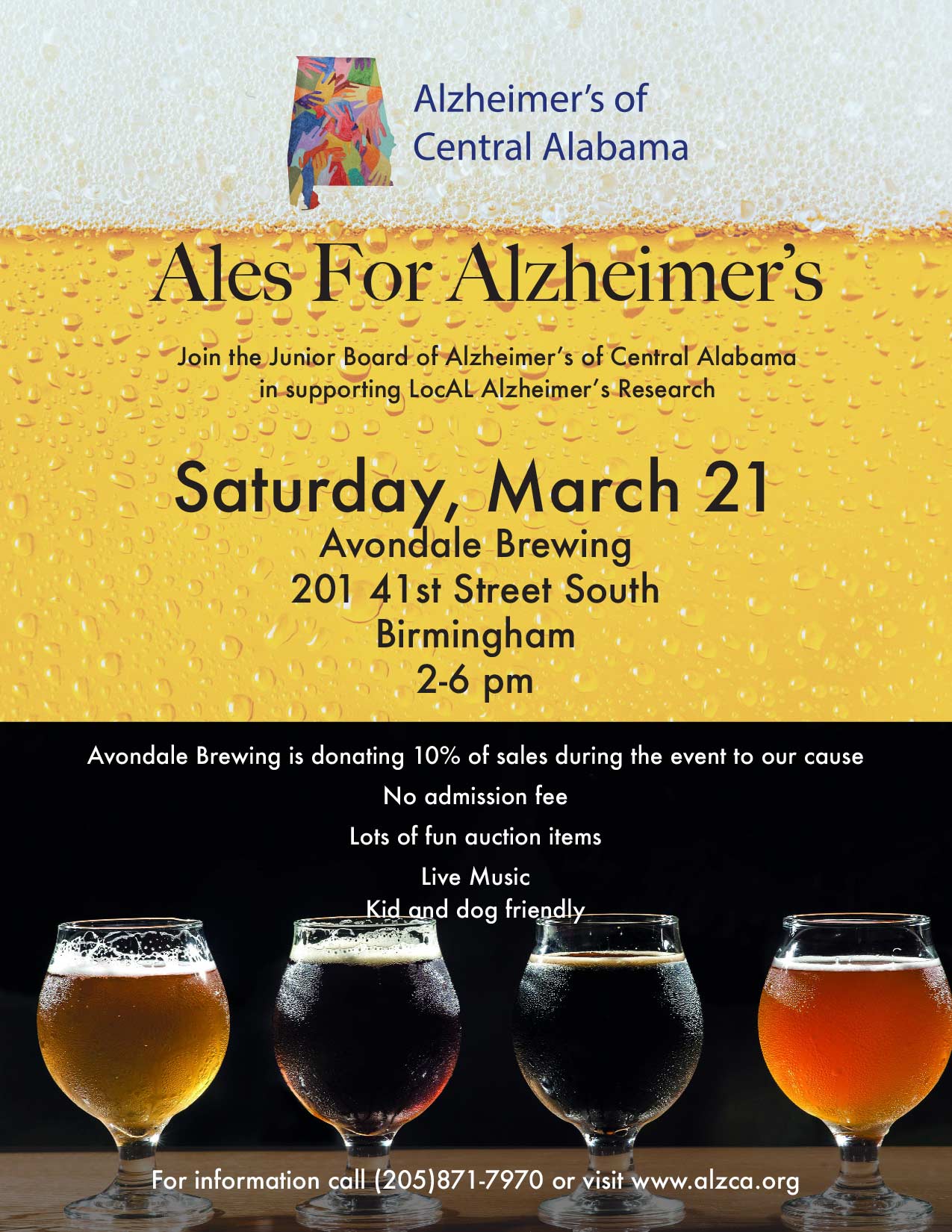Make a New Year’s resolution to join a support group:
- February 11 & 25, 11 – 12:30, 300 Office Park Drive, Suite 225
- February 25, 6:30 – 8, Trussville First Baptist Church.
Crimson Community Café, Saturday, February 8, 10 – 11:30, UPerk, Tuscaloosa. Bring your loved one with dementia for free refreshments, live music and great company. For more info, see attached flyer orcrimsoncommunitycafe@gmail.com
M4A is hosting A Break to Educate, Thursday, February 20, 10 – 1, Mountain Chapel Church, Oneonta. Contact Rebecca Walden at rwalden@M4A.org.
As part of their grant, Providing Alzheimer’s ‘n Dementia Assistance, M4A has grant funding to assist with the start-up of 2 respite programs in Shelby County. There will be a public interest meeting Friday, February 21 at the Pelham Recreation Center. See the attached flyer. For more info: Jennifer Fuller (205) 670-5770 ext. 121 or (866) 570-2998, jfuller@m4a.org.
Queso & Questions, Thursday, February 27, Avondale Brewery upstairs event room. This is the ACA Jr. Board’s annual education event. Dr. David Standaert, Chairman of the UAB Department of Neurology, will be our guest speaker. The event is free with a Taco Mama taco bar and beer tickets. Reservations are requested www.alzca.org.

Stress Busting Program for Family Caregivers, 9:30 – 11 am, for 9 weeks starting March 2, at Caring Days in Tuscaloosa. Contact Nikki Poe at nikki.poe@westal.org.
Rojo is hosting a % of sales event to raise money for ACA’s Jr. Board and research, Tuesday, March 10, 5 – midnight. Rojo is a vibrant gathering place serving Latin & American dishes. 2921 Highland Ave, Birmingham.
Ales for Alzheimer’s Saturday, March 21, at Avondale Brewery. The Jr. Board’s major spring fundraiser is a family friendly event featuring beer, food, music, a raffle and auction. All proceeds benefit ACA’s Pre Doctoral Scholars Program in Alzheimer’s Research at UAB.

The UAB School of Nursing is offering a conference, “Strategies for Preventing & Managing Difficult Dementia Behaviors”, with Rita Jablonski, PhD, CRNP, FGSA, FAAN, Friday, March 27, 8:30 – 3:30. See attached flyer.
ACA Fifth Tuesday Lunch & Learn, March 31. Details to follow.
News to know:
Being Patient spoke with Teepa Snow, an occupational therapist and dementia care educator, about ways to improve quality of life as a caregiver for someone with dementia. “One of the hardest things to recognize is that we can’t have what we used to have. We are going to have to be willing to let go to some extent. That doesn’t mean we give up on it, but we can’t have it be the thing that guides. Trying to duplicate what we had before is going to result in a feeling of, “This isn’t right. This isn’t enough…. So we have to recalibrate our relationship to the abilities of the person. https://www.beingpatient.com/living-a-better-caregiving-life-teepa-snow/?utm_source=Being+Patient+Newsletter&utm_campaign=93fb65b306-EMAIL_CAMPAIGN_2020_02_06_05_44&utm_medium=email&utm_term=0_95b92454c1-93fb65b306-109213217
A February 5, 2020 Los Angeles Times article reported that the late, legendary actor Kirk Douglas and his wife Anne donated $15 million to build a new Motion Picture & Television Fund memory-care unit for people with Alzheimer’s disease or another dementia.
A February 3, 2020 New Atlas article spotlighted new research on the link between regular aerobic exercise and Alzheimer’s disease. The study, out of the University of Wisconsin, found that participants who were given a personal trainer and intense training programs developed improved cardio fitness, more active lifestyles and scored higher on cognitive tests of executive functioning when compared to participants who just received information on healthy lifestyle changes. “This study is a significant step toward developing an exercise prescription that protects the brain against AD, even among people who were previously sedentary,” said lead investigator Ozioma C. Okonkwo. Alzheimer’s of Central Alabama funded Okonkwo’s work when he was a student at UAB.
A January 17, 2020 Digital Journal article looked at the value of evidence-based brain training to maintain or improve cognitive abilities. Over the past few years the importance of physical exercise has been stressed – brain training is just as critical. Brain training (or cognitive training) refers to a program of regular activities purported to maintain or improve a person’s cognitive abilities. You can register online at brainhq.com or download the free BrainHQ app and do a few minutes of exercises every day for free, until you are ready to make a bigger time commitment. A subscription costs from $8-14 per month depending on type of subscription. Read more: http://www.digitaljournal.com/tech-and-science/science/q-a-emerging-consensus-for-evidence-based-brain-training/article/565441#ixzz6DHzXYMWU
FDA Approves Insomnia Drug Belsonra for Alzheimer’s Patients: https://www.beingpatient.com/fda-approves-insomnia-drug-alzheimers/?utm_source=Being+Patient+Newsletter&utm_campaign=93fb65b306-EMAIL_CAMPAIGN_2020_02_06_05_44&utm_medium=email&utm_term=0_95b92454c1-93fb65b306-109213217
It may seem outlandish now, but in the not-so-distant future, we may be able to call on voice assistants like Alexa, Siri or Google Home to help detect dementia and early cognitive impairment. Researchers at Dartmouth-Hitchcock and the University of Massachusetts Boston have received a 4-year, $1.1 million grant from the National Institute on Aging (NIA) to study if voice and language patterns captured by voice assistants can be used to identify people in an early stage of dementia or cognitive impairment. See the news release.
A February 2, 2020 60 Minutes broadcast segment with host Bill Whitaker reported on FTD (frontotemporal dementia), which attacks the frontal and temporal lobes of the brain, looking back on a segment from 2019 featuring UsAgainstAlzheimer’s advocate Tracey Lind, who has the condition. The lab of Dr. Bruce Miller at the University of California San Francisco is doing cutting-edge research on FTD, which can affect speech, personality, judgement and empathy. It can be misdiagnosed as mental illness and illusive to get a correct diagnosis.
Exposure to bright light may improve sleep and ease depression and agitation in people with Alzheimer’s disease. Bright light therapy has been used for decades to treat “winter blues” and other mood disorders. This new study suggests that light therapy, or even spending more time outdoors in sunlight, may have benefits for people with Alzheimer’s disease as well. https://www.alzinfo.org/articles/prevention/how-light-may-help-people-with-alzheimers-disease/?awt_a=2MTD&awt_l=PbANV&awt_m=JBP8We4FoNclTD
Essay contest for teens: Hilarity for Charity is sponsoring Humans of Dementia: An Intergenerational Storytelling Contest with support from AARP, Generations United, Memory Well, and Associated Collegiate Press and National Scholastic Press Association. To be eligible, the writer must be currently enrolled in high school or college in the U.S. or Canada and the story must feature someone currently living with or who has passed away from Alzheimer’s disease or another dementia. Learn more on the Humans of Dementia submission webpage. The deadline is March 13. Humans of Dementia: An Intergenerational Storytelling Contest with support from AARP, Generations United, Memory Well, and Associated Collegiate Press and National Scholastic Press Association
Did you know? Planet Fundraiser is an app that lets you give back to non-profits, schools, and groups simply by taking a picture of receipts from merchants you already shop at. You shop and participating merchants donate to the charity of your choice.

You must be logged in to post a comment.